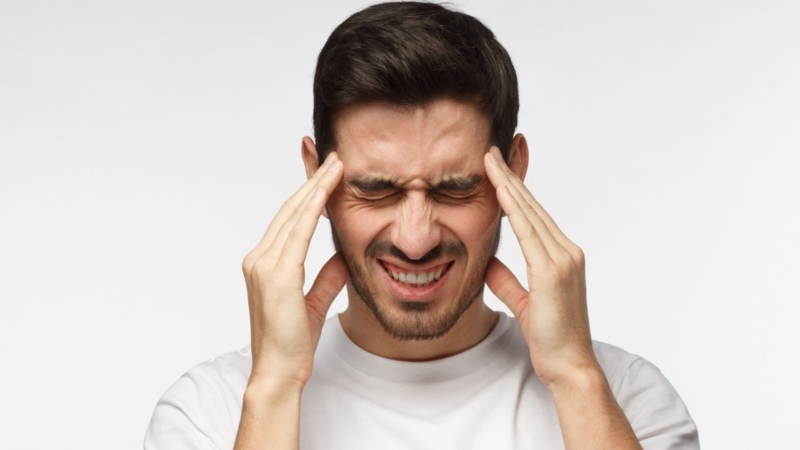Suffering from chronic headaches is a difficult and often painful experience, one that can leave you feeling helpless and frustrated. Unfortunately, there are various types of chronic headaches that can affect anyone and it can be hard to know what treatments will work best for them. In this complete guide, we will discuss the various types of chronic headaches, as well as provide effective treatment options so that you can gain relief from your pain.
Are you suffering from chronic headaches?

You’re not alone – 12% of world population experience some form of headache in their lifetime. With The Complete Guide to the Types and Treatment of Chronic Headaches, we’ll help you explore the different types and discuss how to manage them effectively. We take away all the guesswork so that you can make informed decisions about your treatment plan based on your specific needs.
Stop letting headaches dominate your life! Take control with our comprehensive guide and enjoy days free from pain. Our advice will help identify which treatments work best for you, allowing you to live life to its fullest again without worrying about dreaded chronic headaches.
Get started now reducing or eliminating those troublesome moments caused by chronic headaches in an instant!
What is a chronic headache?
Chronic headaches are defined as recurring headaches that last for longer than four to six months. These headaches can range from mild to severe in intensity and occur more frequently than other types of headaches. They can also be caused by a variety of factors, such as stress, poor posture, sleep deprivation, dehydration, certain medications, and even physical trauma.
Many people who suffer from chronic headaches experience a significantly reduced quality of life, as the pain can be debilitating and interfere with everyday activities, In addition to that, they can also experience symptoms like nausea, vomiting, light sensitivity, and sound sensitivity. It is important to understand the type of chronic headache you are experiencing to receive proper treatment.
Types of chronic headaches

Several types of chronic headaches can affect people. The most common ones include:
- Migraines: intense headaches that may cause vomiting, nausea, light, and sound sensitivity as well as visual disturbances.
- Tension headaches: can be caused by stress and poor posture. These headaches are usually described as feeling like a band around the head or a dull ache in the neck or shoulders.
- Cluster headaches: these are one-sided headaches that are very intense and can last from one hour to three hours. They are often accompanied by facial pain, watery eyes, and a stuffy nose.
- Sinus: these are caused by inflammation in the sinuses and can be accompanied by a fever, congestion, facial pressure, and even earache.
5 Treatment options for chronic headaches
There are various treatments available to help manage chronic headaches. These include medications, lifestyle modifications, and alternative therapies.
1. Medications: over-the-counter pain relievers like ibuprofen or acetaminophen can help alleviate headache symptoms. Your doctor may also prescribe stronger pain medications or preventative medications to reduce the frequency of chronic headaches.
2. Lifestyle Modifications: making changes in your lifestyle such as reducing stress, improving posture, and getting regular exercise can be beneficial in managing headaches. You should also focus on eating a healthy diet that is low in processed foods and high in fresh fruits, vegetables, and lean proteins.
3. Alternative Therapies : several alternative therapies can help to reduce the frequency and intensity of chronic headaches. These include acupuncture, massage therapy, yoga, and meditation. It is important to discuss your options with your doctor before starting any type of alternative therapy.
4. Cognitive Behavioral Therapy (CBT): CBT is a type of psychotherapy that can help to identify triggers for headaches and provide strategies for managing them. Working with a trained therapist can be invaluable in helping to manage chronic headaches.
5. Biofeedback Therapy: this is a form of therapy that uses monitoring devices to help identify triggers for chronic headaches and provide relaxation techniques to reduce their severity.
By understanding the type of chronic headache you have and exploring various treatment options, you can start on a journey toward reducing or eliminating those troublesome moments caused by chronic headaches in an instant!
Don’t let chronic headaches control your life – get informed today and make a plan to start living headache-free!
Causes and risk factors for chronic headaches

The exact cause of chronic headaches is not known, however, certain risk factors can increase one’s chances of developing them. These include:
- Stress – Stress is a major trigger for many types of headaches and can contribute to the development of chronic headaches.
- Genetics – Certain genetic conditions or family history may increase the risk of developing chronic headaches.
- Lifestyle factors – Smoking, lack of exercise, and poor sleep habits can all increase the risk of developing chronic headaches.
- Alcohol and caffeine – Over-consumption of both alcohol and caffeine can trigger or worsen chronic headaches.
- Environmental factors – Exposure to bright lights, loud noises, or strong odors can all trigger headaches.
By understanding the causes and risk factors for chronic headaches, you can start to make changes in your lifestyle that may reduce your risk and help you manage your headaches. Remember, you don’t have to suffer in silence – get the support you need today!
7 Natural remedies for managing the symptoms of chronic headaches

In addition to medications and lifestyle changes, several natural remedies may help alleviate the symptoms of chronic headaches. These include:
- Ginger – Ginger has anti-inflammatory properties which can be beneficial in relieving headache pain. You can drink ginger tea or take supplements for added relief.
- Peppermint oil – Peppermint oil can be used in a variety of ways to help relieve headache pain. You can apply it to your temples, forehead, or the back of your neck. You can also add a few drops to a warm bath or diffuse the oil in your home for added relief.
- Acupuncture – Acupuncture is an ancient Chinese practice that involves the insertion of thin needles into specific points of the body. It has been used to help manage headaches by releasing endorphins and other pain-relieving hormones.
- Yoga – Yoga is a form of exercise that involves stretching, breathing, and relaxation techniques. It can be beneficial in relieving tension and stress which may cause or worsen headaches.
- Meditation – Meditation can be used to help relax the body and mind which may reduce headache symptoms.
- Herbal remedies – Herbal remedies such as lavender, chamomile, peppermint, and skullcap can be beneficial in reducing tension and easing headache pain.
- Essential oils – Essential oils like lavender, peppermint, and eucalyptus can be used in a variety of ways to help reduce headache pain.
By exploring natural remedies for chronic headaches, you may find some relief from their symptoms. However, it’s important to remember that these are not substitutes for professional medical care – always consult your doctor before trying any new treatment
How can I prevent or manage chronic headaches?

The best way to manage chronic headaches is to identify and avoid the triggers that cause them. This may include avoiding caffeine and alcohol, reducing stress levels, staying hydrated, getting plenty of rest, and exercising regularly. Additionally, certain medications can be prescribed to help reduce the frequency or severity of headaches.
It’s also important to practice good self-care by eating a balanced diet and managing your stress levels. Finally, it’s important to seek medical advice if you are experiencing chronic headaches or pain that is interfering with your daily life.
Frequently asked questions about chronic headaches
Q: What is the difference between chronic and acute headaches?
A: Acute headaches are usually caused by a specific event or trigger. They may be mild to severe in intensity but they usually last less than four hours. Chronic headaches, on the other hand, usually occur more frequently and last longer than four hours.
Q: What are the typical symptoms of chronic headaches?
A: Common symptoms of chronic headaches include a dull, constant pressure or throbbing pain in the head, neck, and/or face; sensitivity to light and sound; blurred vision; fatigue; difficulty concentrating or focusing; and irritability.
Q: What could be causing my chronic headaches?
A: There are several potential causes of chronic headaches including stress, hormones, sinus infections, sleep disturbances, dehydration, poor posture or eye strain, or certain medications. It is important to talk to your doctor for a proper diagnosis and treatment plan.
Conclusion
Chronic headaches can be difficult to manage, but with the right tools and understanding of your condition, you can learn to live headache-free. Speak with your doctor about proper diagnosis and treatment options so you can find the best solution for your needs. Make lifestyle adjustments such as reducing stress, exercising regularly, and eating a healthy diet that is low in processed foods and high in nutrient-rich whole foods.
With the right treatment plan, you can manage your chronic headaches and start living a healthier and more productive life, If you need any life-care health tips please visit our website by clicking here.









